Their ‘greatest journey’ begins: Class of 2028 dons ‘coat of compassion’
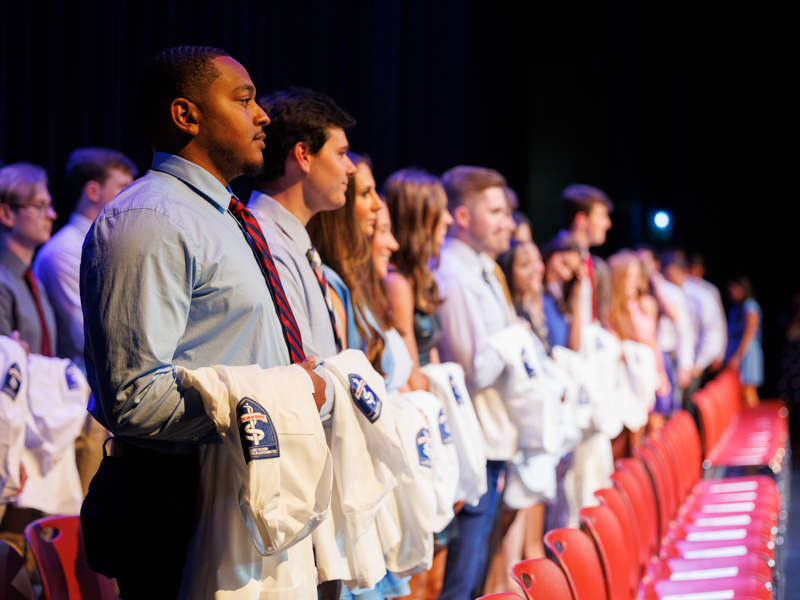
For last week’s Class of 2028 White Coat Ceremony, more than 160 entering medical students at the University of Mississippi Medical Center slipped into something more comforting.
Comforting for them – in the knowledge that they had officially entered the medical profession. Comforting, too, for their future patients, who will see the white lab coat as the wearer’s mark of sureness and constancy. And comforting as well for the loved ones who have seen them through this far.
In keeping with this annual medical school tradition and rite of passage, held Thursday night at Jackson Preparatory School, the students, one by one, put on for the first time the short white coat that, beginning this week, will be theirs through the four years of medical school.
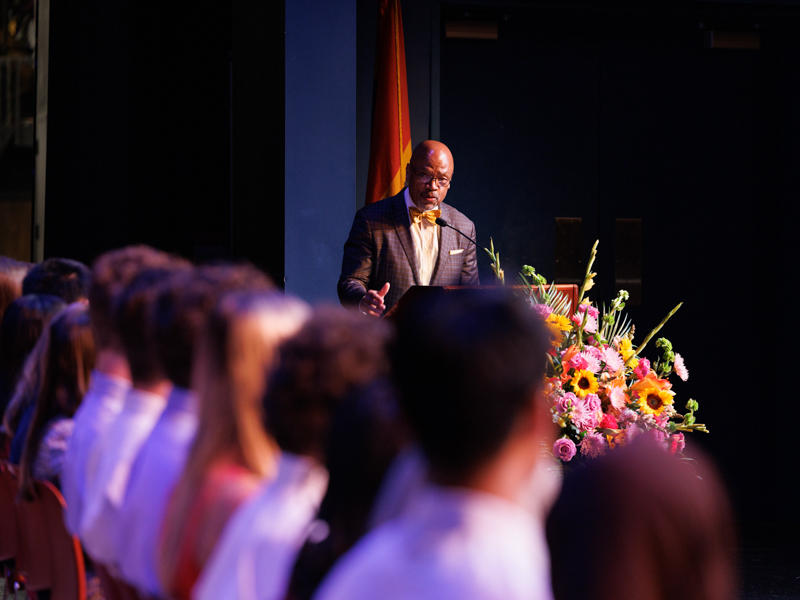
Among those who formally ushered them into their profession was keynote speaker, Dr. Henri Ford, a celebrated pediatric surgeon, president of the American College of Surgeons and dean and chief academic officer of the University of Miami Leonard M. Miller School of Medicine.
Known for performing the first successful separation of conjoined twins in Haiti and for his seminal research on a devastating intestinal disease affecting newborns, Ford congratulated the students for embarking on their life’s “greatest journey, and most rewarding journey.”
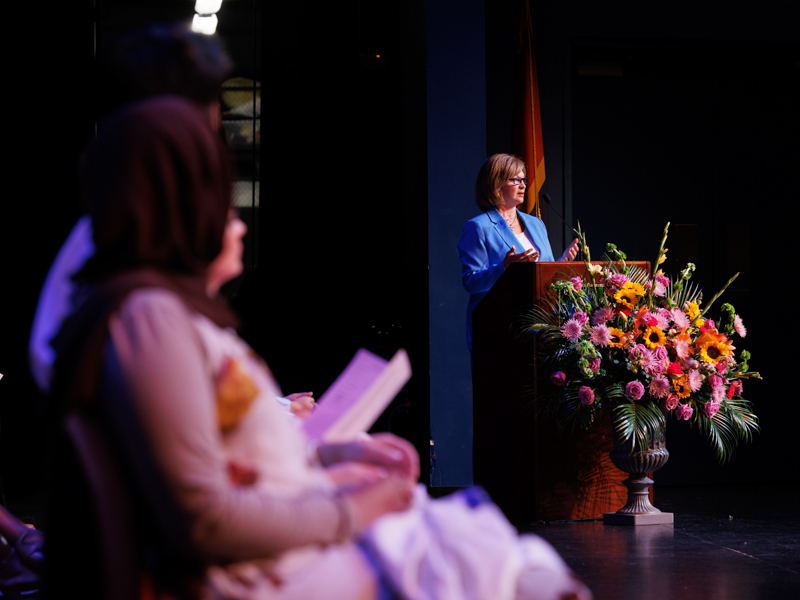
He was introduced by Dr. LouAnn Woodward, vice chancellor for health affairs and dean of the School of Medicine, who praised Ford for prioritizing “what is best and right for our patients … and our students.”
A Princeton University undergraduate and graduate of Harvard Medical School, Ford completed his surgical residency at New York Hospital Weill-Cornell Medical College and received further training at the University of Pittsburgh School of Medicine and the Children’s Hospital of Pittsburgh before earning a Master of Health Administration degree from the University of Southern California.
Born in Haiti, he urged the “young,” “beautiful,” “eager” first-year students before him to take inspiration from, among others, another immigrant: biochemist Dr. Katalin Kariko, who came to the United States from Hungary.
For years, Kariko struggled to secure funding for her investigations into the potential of messenger RNA, but fought on and, in 2023, was named the co-winner of the Nobel Prize in Physiology or Medicine.
“She persevered and never gave up,” Ford said of Kariko, whose research led to the development of the two most important COVID-19 vaccines – and helped life in the U.S. return to normal.
“People like you,” Ford said, “pushed the boundaries,” and are “the heroes of tomorrow” – people who are apt to practice “a commitment to lifelong learning, the pursuit of excellence and the quest for significance,” and who work, not for glory, “but for service to humanity.
“True significance,” he said, “is doing something to transform your environment such that it will be better for your having been there.”
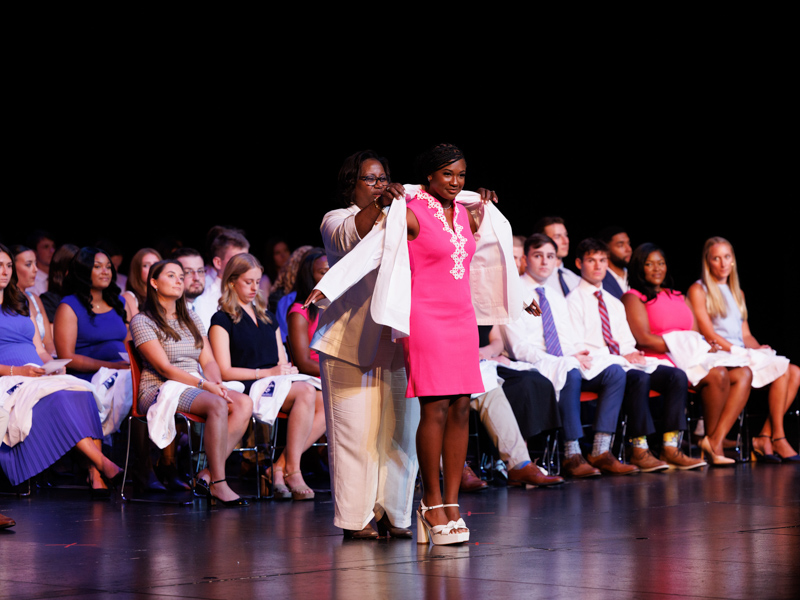
Other highlights of the ceremony included the reciting of the Oath of Hippocrates by students, who pledged to “lead my life and practice my art in uprightness and honor.”
After donning their white coats, with assistance from Woodward and Dr. Loretta Jackson-Williams, professor of emergency medicine and vice dean for medical education, the students received their Keeping Healthcare Human lapel pins – a tradition authored by the Arnold P. Gold Foundation – from Dr. Lyssa Weatherly, associate professor of medicine-geriatrics and assistant dean of student affairs in the School of Medicine.
The M1s and their parents in the audience also heard from Alex Facundus, president of the medical school Class of 2027, who advised the latter to “feed” the former – “they forget to eat,” he said.
From Dr. David Norris, professor of family medicine and assistant dean for academic affairs in the School of Medicine, the students heard: “Thank y’all and welcome to the profession of medicine. You’re in a good place.”
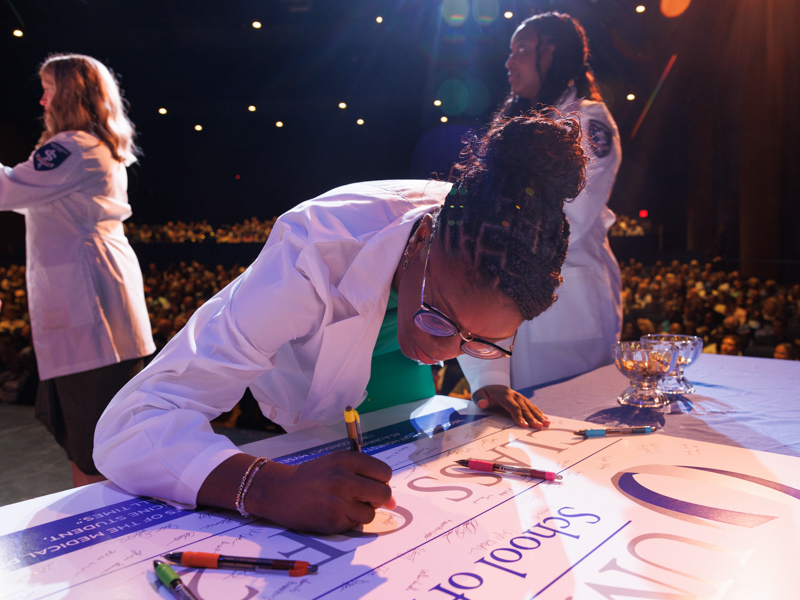
From Dr. Demondes Haynes, professor of medicine, Division of Pulmonary and Critical Care, and associate dean for medical school admissions, they heard that they were now wrapped in a “coat of compassion – and your patients will view it as such.”
From Woodward, they heard: “The white coat has sort of a special kind of magic,” providing entrance into their patients’ personal lives.
Also assisting with the formalities were Dr. Kristen Alston, associate professor of family medicine, and Dr. Kathryn Schneider, professor of pediatrics and assistant dean for medical school admissions.
Dr. Mike McMullan, professor of medicine, director of the Division of Cardiology and associate dean for student affairs in the School of Medicine, greeted the audience immediately following the students’ procession on stage.
“How do they look?” he said. For the students, the applause that followed must have been comforting, too.
SNAPSHOT: SCHOOL OF MEDICINE CLASS OF 2028
- Under-represented in medicine: 15.4%
- Females/males: 52%/48%
- Representing physician families: 15%
- First-generation college students: 8%
- From rural counties: 36%:
- From medically underserved areas of Mississippi: 97%
- Mississippi residents: 100%
- Number of colleges and universities represented: 32
- Number of different college majors: 26
- Age range: 21 to 43 years; average age: 23 years


